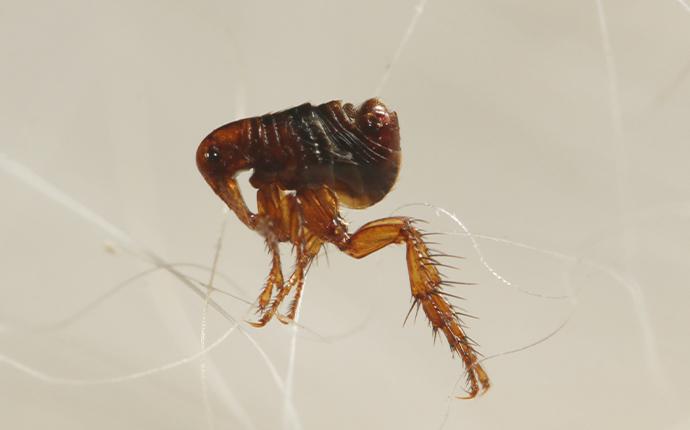
Flea Identification (Siphonaptera)
What Are Fleas?

Fleas are miniscule black bugs, usually less than 1/8 inch long. They have wide rear ends with long back legs, those features are often too small to see with the naked eye. They can change to a reddish color and slightly swell in size after a blood meal. While they have no wings, their extraordinary jumping ability makes up for it, allowing them to jump up and latch onto the skin or fur of any animal that happens to be passing by their vicinity. Despite their miniscule size, fleas can leap from 7 to 13 inches in a single motion – easily enough to reach your ankles.
Fleas are common Snohomish parasites that feed on the blood of their host animals in order to survive. Fleas’ primary host is the domestic cats and dogs but they can also live on humans as well as any other animals they come across.
The flea life cycle is built around their feeding habits. After each blood meal, a female flea lays 4-8 eggs among a host animal’s hairs or in its bedding area. These eggs are tiny white ovals, about 5 mm long, which take 1-12 days to hatch. Over the course of a few weeks, the larvae that emerge will mature into pupae and then emerge as adults. This adult will then jump onto the first host it can find, find another flea to mate with, and the cycle continues. Many adults live only a few days due to the cat or dog grooming itself, but survivors can live as long as a year on their host.
Due to their miniscule size, you probably won’t notice fleas because you see them jumping around but rather because you’ll notice your pets insistently scratching themselves. If you are bitten, you'll probably begin to develop itchy reddened marks on your skin. While initially similar in appearance to mosquito bites, flea bites generally come in tighter groups. Once bitten, your bite might itch for weeks.
The majority of fleas are spread by a few kinds of animals, like birds, cats, dogs and rabbits. You can also fall prey to an infestation if your home plays host to other pests. Rats and mice are established flea carriers, and they may pose a greater risk because of their known ability to go undetected in homes.

A member of our team will be in touch shortly to confirm your contact details or address questions you may have.
Are Fleas Dangerous?
While fleas are primarily a nuisance, don’t be fooled: they can also transmit a number of serious diseases and parasites. The diseases fleas can transmit include Bartonella, typhus, plague, Tularemia, and more. They are probably most notorious for spreading tapeworms to pets. Beyond diseases, they can also cause other negative health effects, such as causing asthmatic reactions in humans that inhale flea feces.
Steps You Can Take To Prevent Fleas In Western Washington
With the nuisance and health risk fleas bring, preventing them is essential if you want to save yourself a lot of headaches. Here are some tips you should try:
- Trim grass and trees in your yard so that it doesn’t look too appealing to fleas and ticks by leaving them nowhere to hide - this will also discourage wild animals from entering your yard.
- Don’t leave pet food bowls outside.
- Take your pet to the vet and give it flea and tick prevention medication or powder.
- Give your pet a haircut if their fur grows too long.
- Vacuum your home regularly and change vacuum bags with every cleaning.
- Eliminate any existing rodent infestations around your home that could track fleas inside with them.
- Seal up holes in your home that could allow fleas, or the animals carrying them, inside.
- Wash your blankets and bedding often, using hot water settings.
- Bathe your pet often, using anti-flea shampoo.
- Use carpet spray to deter fleas from spreading into your carpets.
- Wash pet bedding regularly.
- Comb your pet with a flea comb.
Our Reviews
Hear From Your Friends & Neighbors
-
“Richard was friendly, professional and communicated well. Had Yellow jacket nest in siding sprayed. Hard to get at, but they appear to be eliminated”- D. Mando
-
“I’ve been receiving services for over a year initially to combat carpenter ant infestation. The ants were gone after 1 treatment and I’ve continued this service monthly to continue to manage any new issues. Very professional and great custom”- Marci B.
-
“Richard is wonderful to work with. He does an amazing job around our rural home and has always gone above and beyond to make sure we’re covered and he’s up to date on what’s going on around the house.”- Jonathan W.
-
“Richard has been very generous and willing to accommodate our desire to use little to no pesticides. Most importantly, our mice and wasps have disappeared! Highly recommend working with Guard.”- The Smiths
-
“My initial phone call with company was very helpful, providing me information about product that would be used and the assurance that company knew what they were doing.”- Irene Y.
-
“Great experience using them for my home. Guard pest control has been coming to my house for a long time now and they have helped keep critters from overtaking my house. Great service and good people 100% would recommend.”- Chris F.
-
“I booked an appt for my sister. She has two mice in her house. She was highly pleased with the results and the professionalism and environmental approach they took, and the price. Would highly recommend.”- Steve
-
“Thank You Richard and Guard Pest Control! It’s so nice knowing that you are taking care of all the bugs and pests for us. I appreciate you always taking the time to figure out what is needed at the time, and then making sure it’s taken care”- Janet B.

Our Blog
Recent Posts
Want all the latest news or updates? Browse through our blog to read our most recent posts and featured articles.





